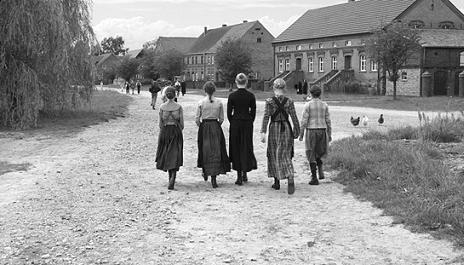“The White Ribbon” is a great film, but… I feel it is a tad overrated, which I attribute to, amongst other things, the fact that it launched at the Cannes Film Festival, where it won the coveted Palme d’Or. You see, I have this theory that for most critics, not following the party line when it comes to Palme d’Or winners is equal to heresy. Now, I’m not saying that they don’t actually like these films that much or that said films are necessarily undeserving of praise. It just seems peculiar to me for almost everyone to always agree that whatever won the Palme d’Or is, indeed, the best film of the year. Especially since this is all so subjective and random, depending on which films are ready in time, whether they’re even submitted to the festival and if so, whether they’re selected, and following all that, it comes down to the whims of the jury to pick a winner. Yet more often than not, the jury’s decision is treated as gospel by critics.
Taking place during the year preceding the start of World War I, “The White Ribbon” is set in a German village where the elders keep the young in a state of fear, supposedly so they can remain pure and innocent. All the same, a series of mysterious accidents and crimes occur, putting everyone even more on edge… Consistently captivating, impeccably lensed and filled with admirably understated yet evocative performances, writer-director Michael Haneke‘s latest somewhat reminded me of M. Night Shyamalan’s unfairly maligned “The Village”. Of course, that one wasn’t a solemn German picture shot in black and white, plus it went for the typical Shyamalan twist ending instead of favoring a typical Haneke ambiguous finale…
And save for the unexpectedly sweet courtship of a shy nurse (Leonie Benesch) by a mild-mannered schoolteacher (Christian Friedel), “The White Ribbon” mirrors other Haneke films in its intent to show the worst in people, from the authority figures (the baron, the doctor, the pastor, etc.) to their creepy children. Misanthropy, cruelty and self-righteousness seem to be a way of life for the inhabitants of the village of Eichwald. Naturally, the temptation is strong to interpret this story as an allegory for the rise of fascism, but I don’t believe there is any easy key to understand it. Haneke has said as much in interviews; this is a film about questions, not answers.
All of this is quite fascinating and superbly crafted, which leads me to reiterate that “The White Ribbon” is indeed a great film. But to go back to my initial point, I still suspect that this artsy version of “The Village” might not have been celebrated with such fervor by critics had it not been previously anointed at Cannes.

